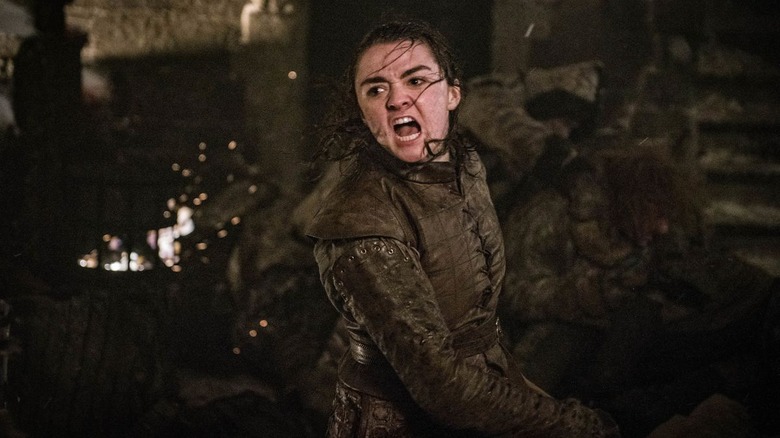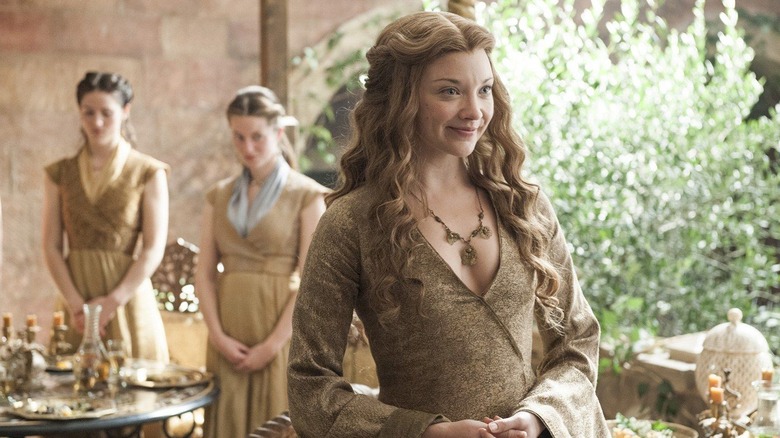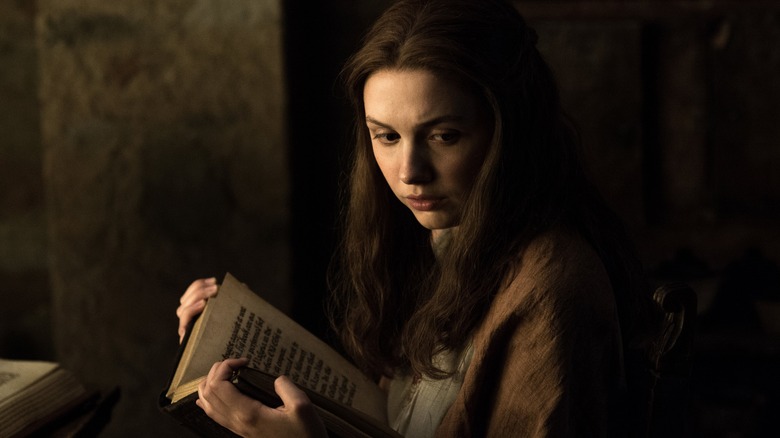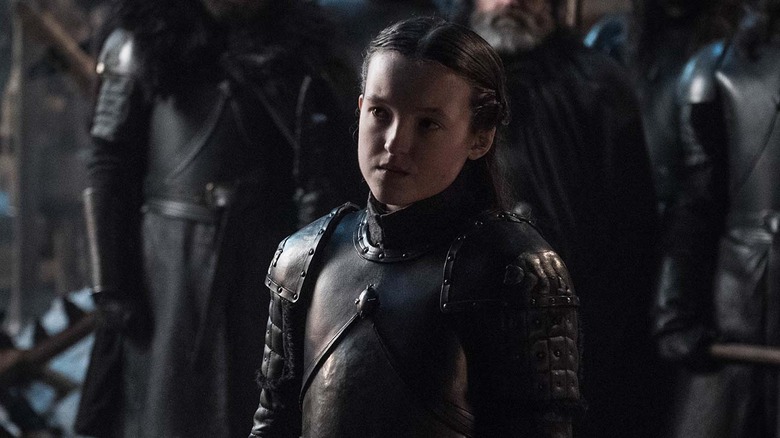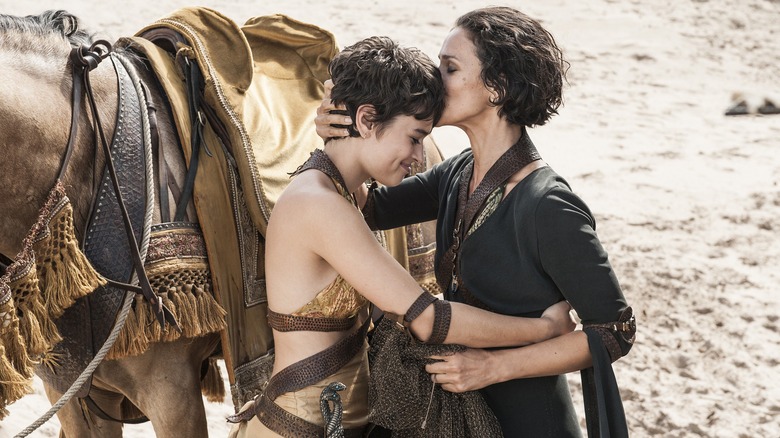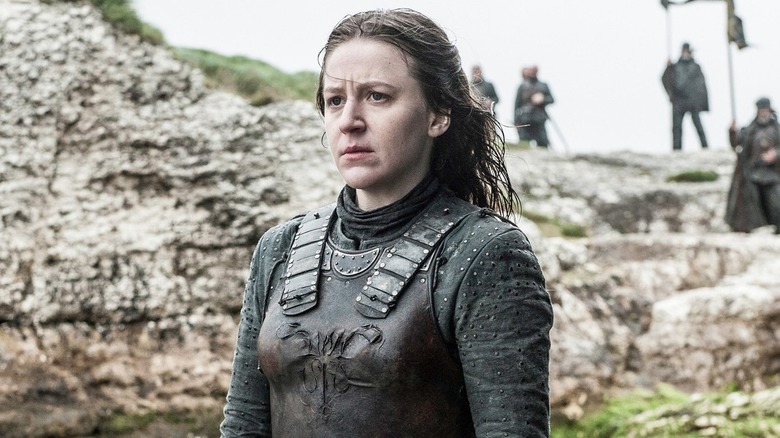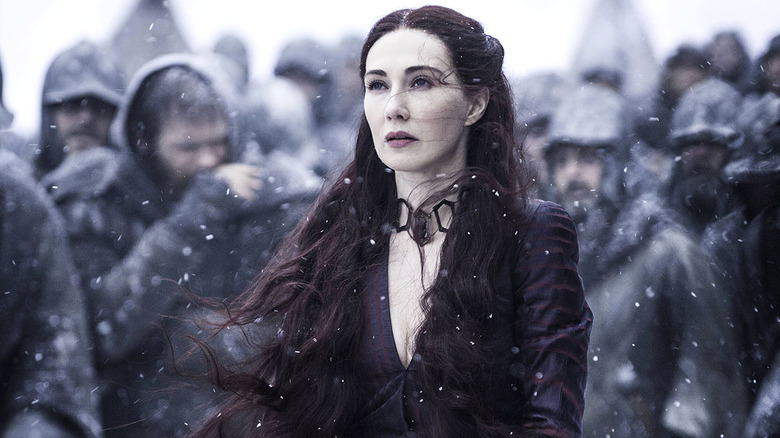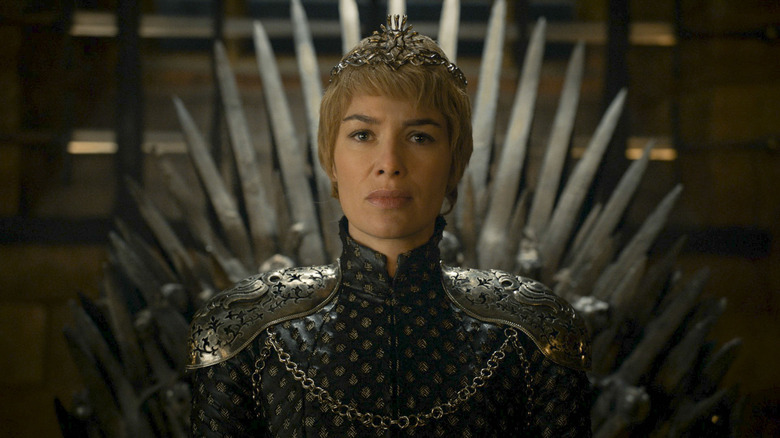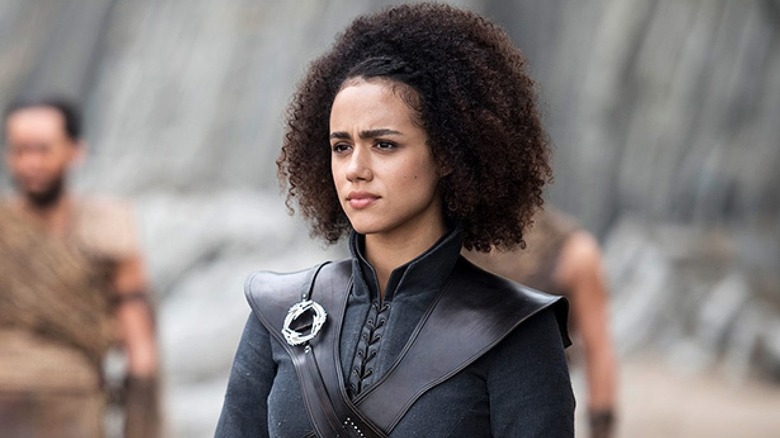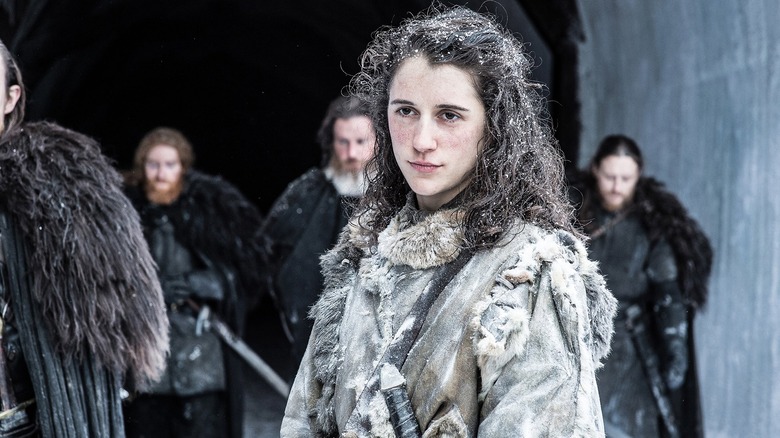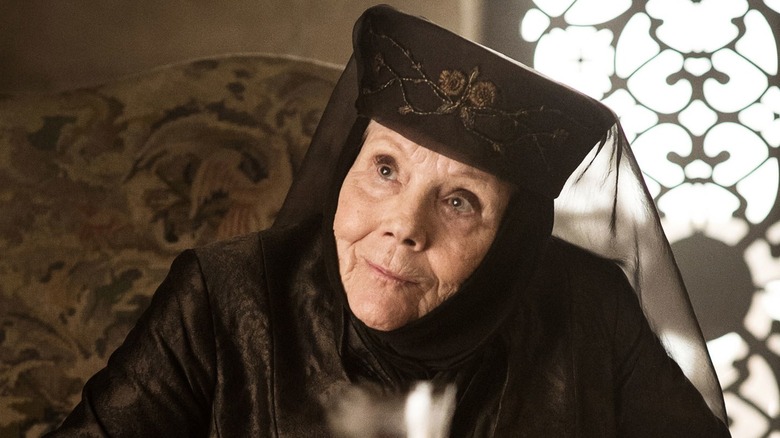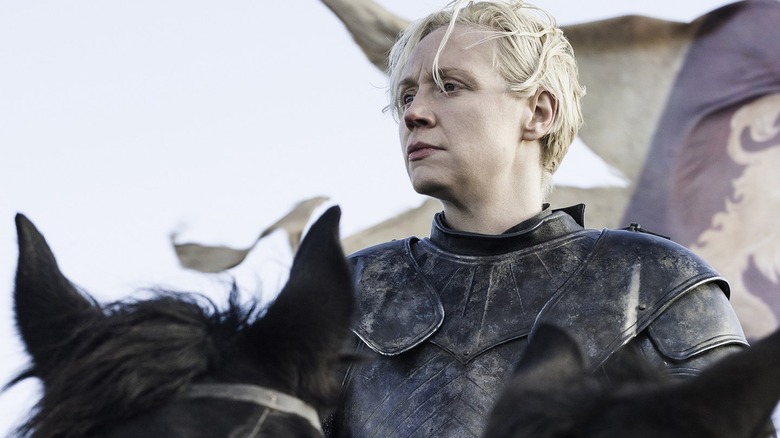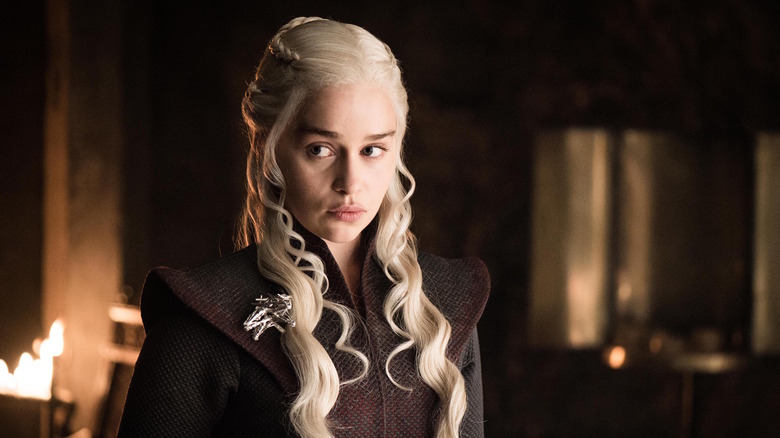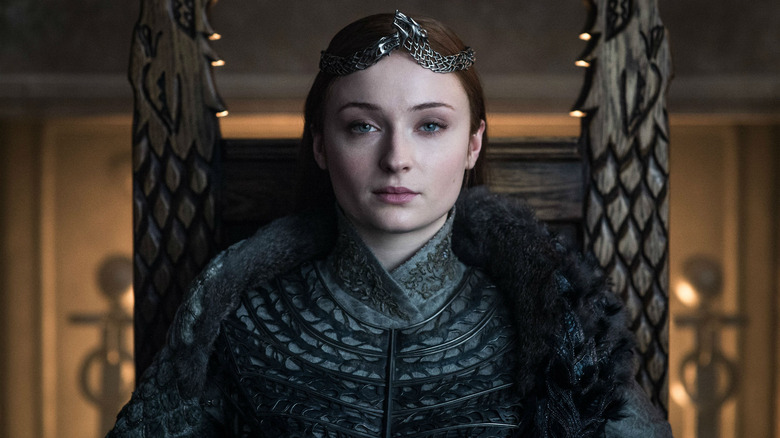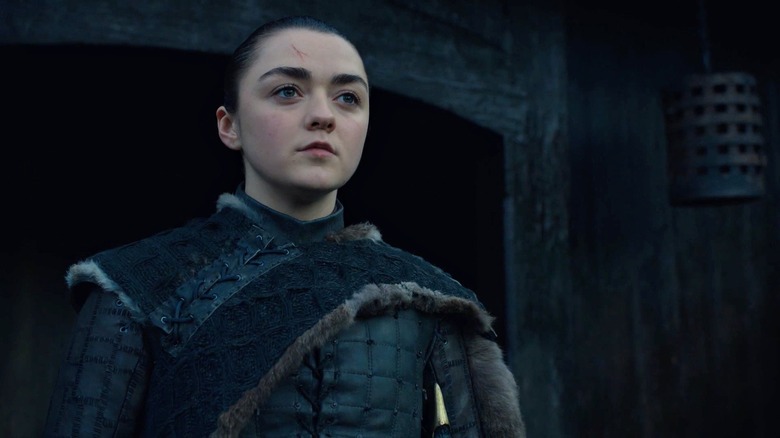Why The Women Of Game Of Thrones Are The True Heroes
Throughout epic fantasy drama Game of Thrones' entire eight-season run on HBO, viewers have seen countless women put through the ringer. Some like Sansa Stark reached the end of the series stronger and wiser than we could have ever imagined them to be. But the road there was a rough one, and Game of Thrones became no stranger to backlash when it came to its portrayal of women.
Although it seemed we would see many of these characters rise to positions of power, in the end, series creators David Benioff and D.B. Weiss — along with a writers room made up almost entirely of men — managed to let nearly all of them down. Regarding the final season of the series, Kevin Fallon of The Daily Beast said that "for everything Game of Thrones has done to change the face of television as we know it, failing women is its ugliest legacy."
There was a time during the show's run, however, when women truly ruled over Westeros, pulling its political strings, and those characters will forever be remembered as the show's heroes.
Margaery Tyrell sacrificed herself for her house
We first met Margaery Tyrell at the beginning of Game of Thrones' second season. In "What Is Dead May Never Die," she and her first husband, Renly Baratheon, were in the midst of putting together their own force so that he might lay claim to the Iron Throne. Over the course of five seasons, she would go on to have a total of three husbands, none of which she would be particularly attached to emotionally, all in the name of putting her house in a better political position.
Vox's Todd VanDerWerff, Kelsey McKinney, and Andrew Prokop discussed Margaery following the airing of the show's Season 5 episode "High Sparrow," in which she was newly married to Tommen Baratheon. When her and Tommen's wedding night was brought up, McKinney noted, "She laughs, but it's the laugh of a woman for whom sex is a necessary tool to maintain stability." Margaery knew a woman's role in Westeros better than most, but, more importantly, she understood how to manipulate that role. She did everything she did not just for her own personal sake, but for her entire family's standing as well.
Gilly discovered the true heir to the Iron Throne
Gilly was introduced at the beginning of Season 2, when Samwell Tarley took an immediate liking to her and tried to convince Jon Snow to help her escape a life dedicated to being both daughter and wife to Craster, the head of the Free Folk. She eventually became Sam's companion, and, over the course of several seasons, followed him from place to place, along with her young son.
For much of her time on Game of Thrones, Gilly flew under the radar, never serving much of a purpose except as a reason for Sam to transform into a hero. But all of that changed in the Season 7 episode "Eastwatch," when Gilly inadvertently set into motion a series of events that would come to define the entire show. As she practiced reading a journal belonging to a previous High Septon, she came across a passage regarding Rhaegar Targaryen's first annulment and subsequent secret marriage. At the time, Sam brushed her off, but it wouldn't be long before the truth of Jon's parentage would find its way to him (and to Daenerys), and it would never have happened if not for Gilly.
Lyanna Mormont was a voice for her house
Lyanna Mormont was only on Game of Thrones for nine episodes, but the young head of House Mormont managed to make one of the most lasting impressions on the series, to the point where David Benioff and D.B. Weiss continued to write new scenes for her. She was certainly one to control a room from her first introduction, in which she famously threw shade at both Jon Snow and Sansa Stark for their representation of House Stark, saying, "As far as I understand, you're a Snow. And Lady Sansa is a Bolton. Or is she a Lannister?"
She would come around to rally behind the new King of the North, however, and her allegiance — and willingness to fight — would never waver. In her final scene, Lyanna took out not only a wight, but a giant wight, with a piece of dragonglass to the eye. Bella Ramsey, the actress who played Lyanna, told The New York Times of the character, "Lyanna's courage and confidence is astounding. She isn't afraid of telling people the truth, even when it's a harsh reality sometimes. She knows that people need to know where they stand."
Ellaria Sand molded warriors
When Game of Thrones first introduced Ellaria Sand, it was as a paramour to Oberyn Martell of Dorne. She was represented as sexually progressive, partaking in something of an open relationship with Oberyn, but her true power wouldn't be revealed until after the Season 4 episode "The Mountain and the Viper." In that episode, she watched Oberyn's brutal death at the hands of Gregor Clegane.
Ellaria spent most of the following season plotting against the Lannisters and eventually killed Cersei and Jaime's daughter, Myrcella, with a poisoned kiss. But her ruthlessness didn't stop at the Lannisters. In 2016, her character made Glamour's list of "Badass Women" on the show, given her calculated usurpation of the Dorne throne with the help of the Sand Snakes.
While her rule would be short-lived, Ellaria showed the kind of ruthlessness Game of Thrones fans had become accustomed to with Cersei, but in a somewhat more sympathetic way. Indira Varma told Entertainment Weekly that, while the audience may have felt sorry for her character's fate, it was important to remember that she was still a murderer. "I hope people feel that," she said.
Yara Greyjoy was a fully liberated woman
From Yara Greyjoy's first appearance in the Season 2 episode "The Night Lands," it was clear that she would be a female character unlike any other that had appeared on Game of Thrones. When her brother Theon tried to argue that she couldn't lead the Iron Island's troops in an attack because she's a woman, Yara quipped, "You're the one in skirts."
She was also the first openly gay female on the show, and, more specifically, the first openly gay female who acted the same way as audiences had seen men act for years. We saw this in the Season 6 episode "The Broken Man" in a brothel scene that played out like most other brothel scenes on Game of Thrones, except, in this case, it was focused on a woman. Vulture pointed out at the time that "Yara is a woman, but she's the one who's got real balls," and noted that her character marked a turning point for the show's portrayal of women, saying, "Yara's sense of empowerment is emblematic of an overall improvement in the way Game of Thrones has dealt with its female characters this season."
Melisandre gave fire to the troops
Melisandre wasn't always the most well-liked woman on Game of Thrones. Her allegiance — while always true to the Lord of Light — wavered when it came to the show's more mortal leaders, and she did some pretty terrible things in the name of her god (like burning a child at the stake in an attempt to give a man an edge in battle).
But Melisandre turned out to be one of the series' most complicated characters, offering real help and power when it was needed, most notably when she resurrected Jon Snow in the Season 6 episode "Home." In the end, Melisandre was a key figure in the Battle of Winterfell, giving fire to the Dothraki and helping to eliminate the White Walker threat.
If anything, the character Melisandre could have used more screen time, a sentiment that actress Carice van Houten echoed in an interview with Entertainment Weekly. "I would have liked to know a bit more about her past. Because she was a slave," she said. "It would have been a nice moment to show she is human and connect her to others."
Cersei Lannister took the Iron Throne
Cersei Lannister is, by no means, a heroic character, acting as Game of Thrones' primary antagonist for the majority of its run. But like Melisandre or Ellaria Sand, Cersei was more complicated than most. In 2017, Vulture made a case for the Queen, saying that while she had committed some heinous acts, Cersei did nothing that a male counterpart wouldn't have done in a time of war: "Cersei, of course, has observed this double standard all her life, and how differently shame and power fall on her shoulders because of her gender."
In 2016, Lena Headey, the actress behind the tyrant, told Mashable, "I don't play her as a villain." She explained, "I don't set out to do that consciously, I just play a woman who is a survivor and will do exactly what a man would do." Ultimately, Cersei got the power she sought for so much of her life, even if it only lasted a few seasons. And when she did finally die, it was in the arms of the only man she'd ever loved, who, as the New York Post pointed out, will be remembered as a hero for "protecting his Queen," thanks to Brienne's Book of Brothers entry.
Missandei went from slave to advisor
Missandei was first introduced in the Season 3 opener, "Valar Dohaeris," as a translator and slave. Over the following seasons, she would become Daenerys Targaryen's most trusted advisor and friend, as well as the most prominent woman of color on the entire series. Up until her brutal demise in Season 8's "The Last of the Starks," Missandei gave Game of Thrones at least a little bit of something it had lacked: diversity.
While she never expected her character to make it to the very end, actress Nathalie Emmanuel still mourned Missandei's death, particularly on account of its larger impact on the series. She told Entertainment Weekly in 2019, "I understand people's outrage, I understand people's heartbreak, because this is the conversation around representation and the truth of it is that Missandei and Grey Worm have represented so many people because there's only two of them."
In the end, Missandei should be remembered for what she did for Game of Thrones, in that she portrayed a woman of color who moved beyond the bounds of slavery into a real position of power.
Meera Reed kept the future King alive
Meera Reed was one of the unsung heroes of Game of Thrones. First introduced in Season 3 along with her brother Jojen, Meera initially sought out Bran Stark in order to accompany him to the Three-Eyed Raven. While Jojen was the sibling with power (like Bran, he was a greenseer, able to experience visions), Meera was the fighter, the one who carries the weapons because she's "better with them."
For four seasons, Meera stayed with and protected Bran on his quest to become the new Three-Eyed Raven, even after her brother was killed. Her exit from the show was an unceremonious one — in Season 7's "The Spoils of War," Meera decided to head back to her family before the White Walker attack and told Bran, "You died in that cave," before walking away.
For her part, actress Ellie Kendrick loved playing the atypical female character. She told Sky Atlantic in 2013, "I love the fact that I'm the girl in Game of Thrones who's wearing trousers and doesn't have to get naked or die."
Olenna Tyrell put an end to a child tyrant
Aptly nicknamed "The Queen of Thorns," Lady Olenna Tyrell spent the majority of her time in Westeros pulling strings and throwing out one-liners like, "Once the cow has been milked, there's no squirting the cream back up her udders, so here we are to see things through." Although further along in her years than other Game of Thrones players, Olenna proved herself to be a formidable force, acting as assassin in Joffrey Baratheon's Purple Wedding, as well as placing her son and granddaughter in key positions at King's Landing. She was so strong-willed, in fact, that when it came time for her own death, she went out having delivered one of the most epic monologues the show had ever seen.
Olenna knew how to play the so-called game of thrones. Diana Rigg, the actress who brought the sharp-tongued character to life, told Entertainment Weekly in 2019, "I loved the complexity of Olenna ... She was a political woman, and she played the game brilliantly. Anything and everything executed ruthlessly for the survival of her family."
Brienne of Tarth fought against gender stereotypes
When Brienne of Tarth was introduced in Season 2's "What Is Dead May Never Die," it was as a warrior, and she continued to uphold this role throughout her entire series arc. Having first sworn her fealty to Renly Baratheon, she went on to swear an oath to Catelyn Stark after his death and, by default, to Catelyn's two daughters. With the exception of Jon Snow, Brienne of Tarth could probably be pointed to as the most honorable character on the entire series.
Finally, in "A Knight of the Seven Kingdoms," Brienne was finally given her well-deserved recognition when Jaime granted her knighthood. Regarding the turning point for her character, Gwendoline Christie told Entertainment Weekly, "She was in Renly's Kingsguard but has never been part of the establishment, really." She added, "No matter how much you carve a place out for yourself outside of things there's something about getting acceptance from people that you love." In the end, Brienne became the head of Bran's Kingsguard, which, with the exception of her heartbreak in "The Last of the Starks," meant she got one of the happiest outcomes.
Daenerys Targaryen took out tyrants across Westeros
Of all the heroic female characters on Game of Thrones, Daenerys Targaryen is by far the most heartbreaking to discuss. Having begun her story as her brother's pawn, Daenerys would spend eight seasons coming into her own, freeing enslaved lands, and exacting revenge on those who would oppress others. She would gain an incredible title, and she would make her way across the Seven Kingdoms and lay claim to the Iron Throne.
While her final turn as a villain may have come as a shock to some, it wasn't completely out of nowhere. We've seen Daenerys be ruthless in her means throughout the series, regardless of however pure her intentions have been. Describing her final break, David Benioff said, "You look at those people who have been closest to her for such a long time, and almost all of them have either turned on her or died. She's very much alone, and that's a dangerous thing for someone who's got so much power to feel that isolated."
In spite of how her mental stability waned over the course of the final season, Daenerys' legacy should perhaps be that she liberated so many groups throughout Westeros.
Sansa Stark gained independence for the North
If we were to have taken bets on who would win Game of Thrones during its first season, Sansa Stark might just have been at the bottom of the list. Like many other women on the series, Sansa was tortured and brutalized. Unlike many other women on the series, however, she came out of it unbroken. "Many underestimated you," Tyrion told her at the beginning of Season 8. "Most of them are dead now."
By "The Last of the Starks," Sansa reached a point where she fully understood how to manipulate information, and she shared Jon's secret with Tyrion, knowing full well what the consequences would be. D.B. Weiss said, "She's a student of Littlefinger, and she knows how information travels, and she can think many steps ahead into the game."
The series ended with Sansa being crowned the Queen of the North, having gained independence for her region. For everything that she was forced to endure, she was able to come out of it on top. In an interview with Rolling Stone, show creators Weiss and David Benioff said, "Now she is one of the most formidable people in the story."
Arya Stark became the person she wanted to be
When Arya Stark (played by Maisie Williams) killed the Night King in "The Long Night," it was the culmination of a series of kills over an entire childhood and, while surprising, was incredibly satisfying for fans of the girl who had been forced to face the horrors of Westeros at such a young age. Arya's arc seemed to have always been leading her to that point, from her infamous list to her refusal to conform to expected roles.
For David Benioff and D.B. Weiss, Arya's ultimate kill was something they had known about for years. Benioff said, "Jon Snow has always been the hero, the one who's been the savior, but it just didn't seem right to us for this moment."
From the beginning, Arya was a fiercely independent character, having forged her own path and followed her own heart. In speaking with Rolling Stone about the character, the showrunners talked about how Arya had never needed a moral redemption in the series. "We see her as an extremely resilient child who made the best of an extremely difficult childhood to become a singular woman," they said.
